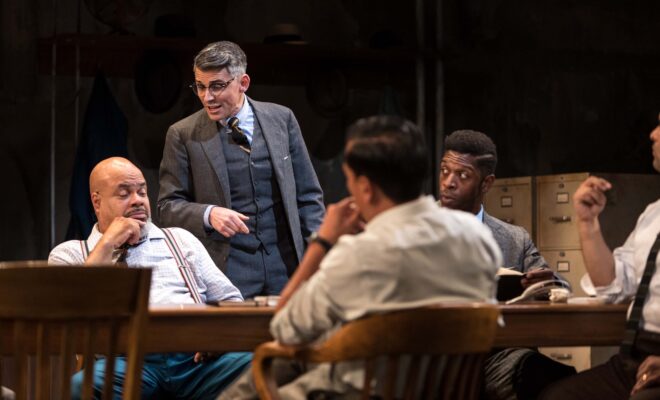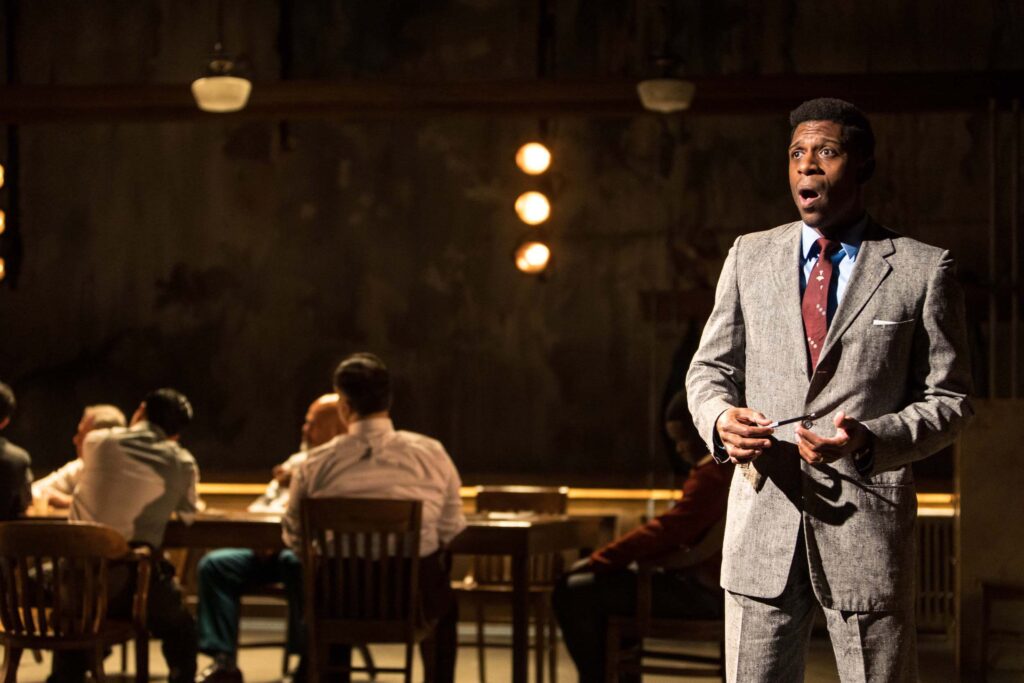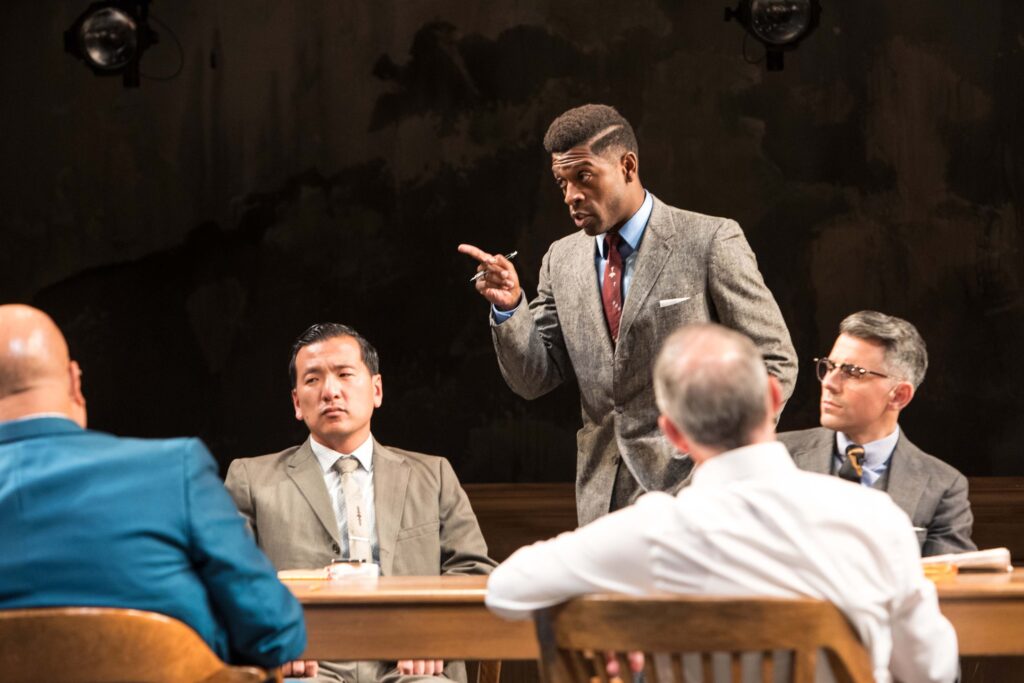
Feature
Asolo Rep Stages ‘Electrifying’ Musical Take on Twelve Angry Men
By Scott Ferguson | Photos by Dan Norman | April 2024
The most common question people ask when they hear that Asolo Rep is staging a musical version of the classic jury room drama Twelve Angry Men is “Why a musical?” Peter Rothstein, in his first season as Asolo Rep’s producing artistic director, is also directing the show. He understands the question, but adds some historical perspective.
“I think when we step back from a lot of musicals, they probably sounded a bit like crazy ideas,” he says. “I’m guessing when someone pitched West Side Story and said, ‘I want to do Romeo and Juliet about modern-day gangs in New York,’ people probably thought, ‘Hmm, that doesn’t sound like Oklahoma! or My Fair Lady.’ But I think when you have the right team of people and the right impulses, or you find the rules around why people sing and why music exists in the world, then lots of outstanding stories can be set to music. A musical demands heightened emotions, and we certainly have that in Twelve Angry Men.”
The story began in 1954 as a live television drama written by Reginald Rose, about a jury deliberating the fate of a young man accused of murdering his father. Although the teen’s racial identity is never specifically mentioned, it’s clear from the jurors’ comments that he is a member of a minority.
In 1957, actor Henry Fonda collaborated with Rose and director Sidney Lumet to produce a theatrical movie version featuring Fonda, Lee J. Cobb and E.G. Marshall in the cast. Rose also adapted it as a play for the theater which has been staged throughout the world, including a Broadway run in 2004. Showtime aired a production in 1997, directed by William Friedkin with a multi-racial cast; Jack Lemmon, George C. Scott, Ossie Davis and Courtney B. Vance were among the players, with an updated script by Rose.
The newest version, with music and lyrics by Michael Holland and book by David Simpatico, is adapted from Rose’s play, with permission from his estate (with the stipulation that the angry jurors had to remain male, since Rose intended the story to reflect the toxic masculinity of many of the characters). The musical premiered in 2022 at Theater Latté Da in Minneapolis, with Rothstein as director. The Minneapolis Star-Tribune’s review proclaimed that “…this Twelve Angry Men is as close to flawless as it could be. The electrifying cast creates a true ensemble. Director Peter Rothstein gives it shape, nuance and a propulsive energy.”

Most of the actors from that production are also in Asolo Rep’s staging, including Sasha Andreev as Juror 4 and Curtis Bannister as Juror 8 (the jurors are known only by their numbers in the show).
Bannister says, “Twelve Angry Men is an amazing play. The music, lyrics and script remain faithful to Rose’s original vision, but they transform it into a contemporary-musical-meets-heightened-stage-play. It’s presented in an amazing way, because it all takes place in one space and essentially nobody leaves the stage.”
Like many of the actors in the Asolo Rep production, Andreev was involved as an actor in the workshop process as the play was being developed in Minneapolis. He says the musical adds a new dimension to the Twelve Angry Men canon of productions and variations on television, stage and film over the past seven decades.
“I think the musical medium allows you to expand or unpack a narrative in a way that straight theater can’t always do,” Andreev says. “The challenge with this piece is that the music has to maintain the tension and the rhythm of the spoken text because the play is such a well-crafted piece of writing. So the goal was to keep the tension of the original script, while still being able to expand certain moments to advance the story through music. It was also important to retain the 1950s atmosphere of the original, while observing the story through a modern lens. And one of those ways it does that is through color-conscious casting, placing the actors of color in that room in that time period — and to show how all those men would relate to each other then.”
In the Asolo Rep production, audiences will get to experience the perspective of each of the jurors — quite literally. Through the magic of stagecraft, the set revolves throughout the show to afford different views of the men as they argue and rebut their theories of the defendant’s guilt or innocence. This effect also gives the audience a sense that time is passing, emphasizing that the story is unfolding in real time in the tense hours of the jury’s deliberations.

Unlike many musicals, there is no dancing, but there is a choreographer – Kelli Foster Warder. As Rothstein explains, “The blocking of the actors is marked to music. It doesn’t look like footwork or traditional dance, but we do use heightened movement, including slow motion and freezes. The piece was written originally for television, so it’s rooted in realism. But a musical propels you to a more expressionistic place.”
The actors in the cast praise how music that reflects the play’s era and mood is used throughout the show — ranging from 1950s cool jazz to a singing style known as vocalese, to blues, swing and other genres.
“Nearly every note that’s sung has a purpose to propel the drama forward,” Bannister explains. “It never feels like ‘We need to add a song here because it’s a musical and music should be here.’ ”
Andreev adds that “sometimes music accompanies action and spoken words that lead into a song. Although music is used in different ways, what’s consistent is that at the end of most musical sequences a mind is changed.”
Rothstein believes one of the main lessons of the show is that — at a time when people’s opinions often tend to be fixed and reinforced by what they choose to watch, listen to and read — minds can be changed.
“Ultimately I think what the piece is saying is that the point of discourse and debate isn’t necessarily clinging to one political agenda or another. It’s often seen as a sign of weakness in modern culture that your political convictions are unwavering, but this piece contends that changing your mind can be the most heroic of choices.”
Another aspect of the criminal justice system Twelve Angry Men illuminates is that, as imperfect as the quest for justice may be in the show and in the system, it is up to ordinary citizens to decide whether to find a defendant is “guilty” or “not guilty.”
“The musical illustrates the incredible promise and privilege that comes with our American judicial system,” says Rothstein. “It’s not a dictatorship, it’s not a monarchy. The people are the jurors, justice is in the hands of the people; that’s not true even in every civilized nation.”
The heated arguments that eventually give way to the jury’s final unanimous decision are amplified in the musical.
“In a musical you get to expand moments,” says Rothstein. “As we’re leading into the final jurors — the hold-outs — changing their minds, there’s an epic ballad called “Hopefully Not Too Late.” Musicals often include an anthem that makes the theme of the show palpable, inspirational, and that song is the perfect example. While it’s a very intense drama, I find the musical ultimately hopeful.”
Twelve Angry Men: A New Musical runs May 8-June 9 at Asolo Repertory Theatre, 5555 N. Tamiami Trail, Sarasota. For tickets visit asolo.org or call the box office at 941-351-8000.



You must be logged in to post a comment Login